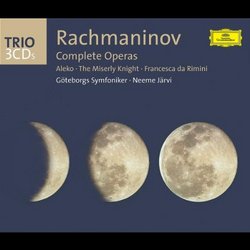| All Artists: Sergey Rachmaninov, Neeme Järvi, Göteborgs Symfoniker, Anatolij Kotscherga, Anne Sofie von Otter, Ian Caley, Ilya Levinsky, Maria Guleghina, Sergei Aalexashkin, Sergei Larin, Sergei Leiferkus, Vladimir Chernov Title: Rachmaninov: Complete Operas (Aleko, The Miserly Knight, Francesca di Rimini) Members Wishing: 0 Total Copies: 0 Label: Deutsche Grammophon Release Date: 6/15/2004 Album Type: Box set Genre: Classical Style: Opera & Classical Vocal Number of Discs: 3 SwapaCD Credits: 3 UPC: 028947704126 |
Search - Sergey Rachmaninov, Neeme Järvi, Göteborgs Symfoniker :: Rachmaninov: Complete Operas (Aleko, The Miserly Knight, Francesca di Rimini)
 | Sergey Rachmaninov, Neeme Järvi, Göteborgs Symfoniker Rachmaninov: Complete Operas (Aleko, The Miserly Knight, Francesca di Rimini) Genre: Classical |
Larger Image |
CD DetailsSimilar CDs |
CD ReviewsOutstanding Rachmaninov operas, though a libretto would've h Eric S. Kim | Southern California | 02/03/2006 (4 out of 5 stars) "Neeme Jarvi and the Gothenburg Symphony Orchestra (Goteborgs Symfoniker) have done an excellent job with Sergei Rachmaninov's three influential operas. The sound quality is amazing, and the soloists sing their heart out...WAY out. Aleko: This is the story of love, deception, and sorrow between an old man, who is now a gypsy, and his unbalanced family. The ending is as tragic as the ending to "Boris Godunov" by Modest Mussorgsky. The Miserly Knight: Albert is a man who finds himself in an inheritance crisis, while his father is a man who can't get enough of his own greed. The two confront each other, through words, and through violence. Francesca da Rimini: The darkest of the three, it tells of how Francesca da Rimini & Paolo Malatesta were sent to hell with their atrocious love affair. I'm giving this box set only four stars, clearly because of lack of the librettos by Vladimir Nemirovich-Danchenko and Modest Tchaikovsky. All in all, this is for those who are interested in Rachmaninov's lesser-known works. I give this an A-" A Very Different Rachamninoff!!! Louie Bourland | Garden Grove CA | 06/20/2006 (5 out of 5 stars) "The great Sergei Rachmaninoff was not primarily known as an opera composer. However, his three operas have an important place in the music history books. This three-disc set includes all three of Rachamninoff's operas in their entirety (one per disc) and are presented in jaw-dropping performances under the baton of conductor Neeme Jarvi. The orchestra as well as the soloists and choirs truly deliver emotionally-drenched performances on all three operas. Musically, these operas may be overwhelming to some. There is a definite darker approach heard in these works which is a drastic departure from Rachmaninoff's romantic-styled Piano Concertos and Symphonies. There is also a definite Tchaikovsky influence heard in this music as well. Depsite the darker atmosphere of these operas, the power of this music is emmense and dynamic while never losing momentum. In other words, this is some great stuff here. While the CD booklet includes synopsises of each opera, there are no libretti included which is a shame because the opera's are sung in Russian. To have the full set of lyrics printed out both in Russian and English would have been fantastic to follow along with while listening. No so here, though. Despite this, this set of Rachmaninoff's complete operas is essential to any diehard Rachmaninoff fan. Even though these operas weren't as successful as his other works, his genius comes through loud and clear here and are just as good as anything else he has done. Definitely Essential Rachmaninoff Operas!!!!" If only it didn't have Leiferkus... Mr. Allan K. Steel | Sydney, AUS | 05/14/2008 (4 out of 5 stars) "I can hardly believe how bad Sergei Leiferkus is in the Aleko recording: how did he get chosen by a major company (DG), etc. Rough, harsh voice, ill-focused and out tune at times. For his big aria "Ves' tabor spit", he is pretty woeful: it's just SO weak apart from anything else! In contrast, Vassily Gerello sings this so wonderfully and passionately under Orbelian on the Delos recording (get that instead for this!).
Otherwise, the other singers are very good on these recordings, the orchestra and sound quality are excellent, and the conducting acceptable. (Though the harp with the distant young gypsy is very weak! Again, Orbelian's recording is vastly better here.) So pity about Leiferkus: this would be a great set otherwise..." |

